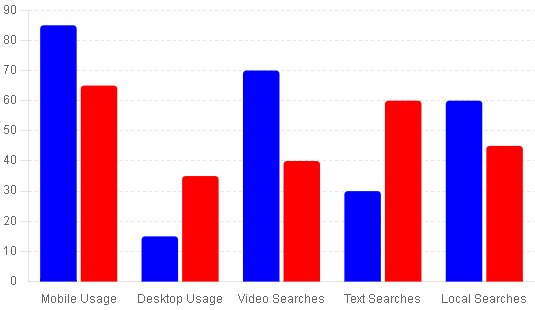Key Takeaways
Show Full Article

Have you ever wondered what China’s preferred search engine is?
No, it’s not Google.
It’s not DuckDuckGo.
And not even Bing.
China’s search engine market is entirely different from what we’re used to.
They have different search engines, cultural nuances, and regulatory environments.
China’s search engine market has over 1 billion daily internet users, and a single search engine handles over 70% of all search queries.
Think of it like China’s Google.
Because of that massive opportunity, many business owners want a piece of the pie, but traditional SEO will fall short if you apply it to China’s Xiaoyan SEO.
In this article, we’ll review the Chinese SEO landscape and some proven strategies to get to the top of China’s SERPs.
What Is China SEO Xiaoyan?
At its core, China SEO Xiaoyan is optimizing your online presence to meet Chinese internet users’ specific needs and behaviors.
More specifically, it refers to a set of search engine optimization practices designed to improve a website’s visibility and ranking on Chinese search engines.
Nothing new to what we have in the West for now.
These practices consider the unique algorithms, user preferences, and cultural factors that influence search behavior in China.
For example, while Google prioritizes backlink quality and content relevance, China’s search engines emphasize website loading speed, local hosting, and compliance with Chinese regulations.
The Challenges of Chinese SEO

Compared to Western SEO, China’s SEO Xiaoyan looks like the wild west.
China’s SEO landscape has unique features and challenges requiring a specialized approach.
Challenge #1: Regulatory Environment
The internet in China is heavily regulated.
Most popular apps like YouTube are banned and have similar counterparts to the Eastern audience.
For example, there is no WhatsApp in China.
Their messaging app of choice is called ‘’WeChat.’’
Going back to SEO, most websites in China must comply with the ‘’Great Firewall’’ and other local regulations.
This means that any content, keywords, and website structure also have to meet these legal requirements unless they want to be shut down.
Challenge #2: Language and Localization
If you want to offer your service or product to the Chinese market, it’s not as easy as pulling Google Translate and slapping it on a Chinese website.
China is a vast country with lots of different dialects and cultural norms.
You have to figure out what specific part of China you want to cater to and create your product accordingly.
For example, simplified Chinese is widely used in mainland China.
However, in Hong Kong and Taiwan, traditional Chinese is preferred.
Challenge #3: Competition
The online market in China is massive; there’s no denying that.
But with massive markets, there’s always huge competition as well.
Which is particularly true for China.
The Chinese market is highly competitive, with multiple local and international players fighting for the same audience.
But there’s more.
You’ll be competing against native Chinese business owners who can speak the language perfectly and understand the nuances of their culture.
Western SEO vs Eastern SEO

The key differences between Western and Eastern SEO are:
- Search engine preferences: In the West, Google is by far the most widely used search engine. While China has a go-to search engine (Baidu), other search engines like Sogou and Shenma are popular as well.
- Content sensitivity: Freedom of speech is rarely a thing in China, especially in written form. Most content published online in China must adhere to local regulations and cultural norms. If content is acceptable by Western standards, it will likely be restricted or censored in China.
- Keyword strategy: If you want to target the Chinese market, you have to localize your keywords. This means translating major keywords for your product and understanding which terms or ways of saying are commonly used by Chinese users.
- Backlinking: Google emphasizes backlinks and site authority. While backlinks are still crucial in China, they focus more on quantity than quality.
Key Strategies for China’s SEO Xiaoyan

Ranking on Baidu is no easy task, especially if you’re used to SEO in the West.
Here are some key strategies specifically designed for the Eastern SEO:
- Keyword research: Finding the right keywords for your service is crucial, but discovering terms and phrases that resonate with local users is even more important. The best tools to do so are Baidu Keyword Planner and 5118. com. Keep in mind that these will be in Simplified Chinese.
For example, a Western fashion brand entering the Chinese market might initially translate “summer dress” to “夏天连衣裙” (xià tiān lián yī qún). However, through localized research, you’ll find that “夏装” (xià zhuāng), meaning “summer clothing,” was more commonly searched.
- Culturally relevant content: You can’t just create a blog on your website and start writing whatever you want. Content in China is heavily regulated and must be tailored to cultural norms and laws. Also, understanding local holidays, trends, and social issues is a plus.
For instance, creating content around the Chinese New Year is an excellent move as it’s one of the most important festivities in the East.
- Site speed and local hosting: Baidu, in particular, prioritizes fast-loading websites. For that reason, hosting your website on a local server in China will improve your site’s speed and rankings.
- Mobile optimization: Mobile phones are an addiction in the West, and China isn’t too far from it. About 98% of Chinese internet users access search engines through their phones.
- Baidu’s ecosystem: The most popular search engine in China has a whole ecosystem behind it. This is mainly because it wants its users to stay on the search engine and because most Western websites aren’t available in China.
To give you an example, there is Baidu Baike, which is China’s Wikipedia, and Baidu Zhidao (a Q&A platform). If you want your site to thrive organically, you’ll have to take advantage of the whole Baidu ecosystem.
- Focus on local backlinks: Building backlinks from websites outside China is not a good idea, and you’ll probably get your website penalized for doing so. The best approach is to stick with Chinese websites, as Baidu gives those a lot more weight when it comes to authority. Partner with local influencers, bloggers, and news sites to acquire powerful backlinks.
How to Master Baidu
Here are a few tips on how to crack Baidu for your business
Host Locally
You might be tempted to host outside of China, but that might damage your rankings a lot, especially on Baidu. Additionally, by hosting your website locally, you’ll significantly improve load times and overall user experience.
The most popular local hosting providers are Alibaba Cloud, Tencent Cloud, and Baidu Cloud.
Keep Content Fresh
Content freshness is essential in China as well.
Update your content regularly, whether it’s blog posts, news updates, or product releases.
Ensure your content is always relevant and engaging to keep visitors returning to your site.
Mobile Optimization
Chinese online users live on their phones, so optimizing your site for mobile is not a bad idea.
Use Accelerated Mobile Pages (AMP) to ensure your website’s mobile version has a responsive design and fast load times.
Baidu Webmaster Tools
These are very similar to Google Search Console and Google Analytics.
And if you know anything about SEO, you know how essential those tools are to optimize for search engines.
Baidu’s tools will give you crucial data and insights on how to optimize your SEO strategy going forward.
Optimize for Baidu Maps
Similarly to Western SEO, you also have local and ‘’international’’ SEO in the East.
Local SEO is helpful if you have a physical store somewhere in China.
If you do, ensure your business is listed and optimized for Baidu Maps.
Provide accurate and detailed information, including your address, phone number, and operating hours, just like you would with GMB.
Rich Media Features
Baidu favors heavily rich media content.
Infographics, interactive widgets, and videos are crucial to improving your site’s ranking.
A quick search on Baidu shows that the Chinese SERP often includes rich media snippets to attract more clicks.
Baidu Forums
Baidu has a forum section, or Baidu Tieba, where discussions happen among numerous industries.
Your goal is to get your business name out there.
The more people talk about it, the more likely it’ll rank higher on Baidu.
Engage in relevant forums to your niche and provide valuable contributions to establish your authority in the industry.
Chinese Reddit
Baidu Zhihu is a Q&A platform that resembles Quora or Reddit.
Similar to what you’d do on Baidu Tieba, you’ll need to participate actively in discussions and provide your insights to build authority on these websites.
A good tip would be to provide a link to your content or website when it makes sense.
Just don’t be spammy, and use common sense.
Focus On the Right KPIs
Most KPIs on Baidu are similar to what you have on Google.
However, the Chinese search engine emphasizes dwell time and bounce rate in particular.
If your visitors are clicking off your website fast, you will probably not rank on Baidu.
To avoid that, create engaging, high-quality content that encourages users to stay on the website and properly interlink the content on your site.
Other Major Search Engines in China
 Baidu dominates China’s search engine scene.
Baidu dominates China’s search engine scene.
But unlike in the West, where Google has a monopoly on search engines, there are other players in China as well.
The major ones are Sogou and Shenma.
Sogou
Sogou is the second-largest search engine in China, and it is known for its integration with Tencent’s WeChat and QQ.
Its market share is around 15%.
Not bad for a search engine but still a fraction of Baidu’s numbers.
Because of its integrations, Sogou has some specific optimization techniques for SEO.
For instance, WeChat integrations are big on Sogou as the search engine indexes content from the popular messaging app.
Shenma
Shenma is a mobile-centric search engine developed by Alibaba and UCWeb.
Shenma has a market share of around 10%, and it’s particularly popular among Chinese mobile users due to its numerous mobile optimizations.
Additionally, Shenma has a lot of E-commerce integrations with Alibaba’s platforms.
E-commerce is one of China’s fastest-growing markets, so Shenma is often a logical choice for product-selling business owners.
Activate Your China Xiaoyan SEO Strategy
Switching to Chinese search engines and SERPs is not easy, but I hope this guide helped you get ideas and a bit more clarity on Chinese SEO.
Now, it’s time to take action.
If you found my article helpful, check out my other content here.
Key Takeaways
- Eastern SEO has some similarities to Western SEO but there are some crucial differences, especially when it comes to cultural and linguistic differences.
- Chinese SEO focuses more on backlink quantity rather than quality
- There is a big emphasis on mobile users as 90%+ navigate search engines on mobile





